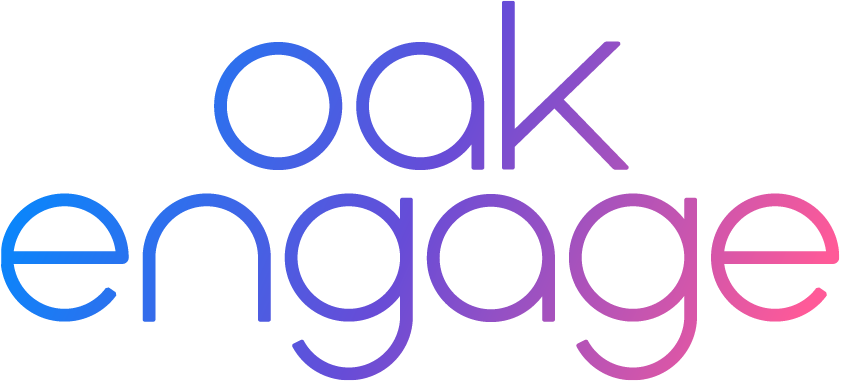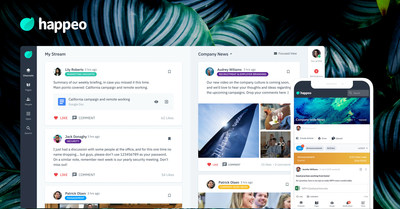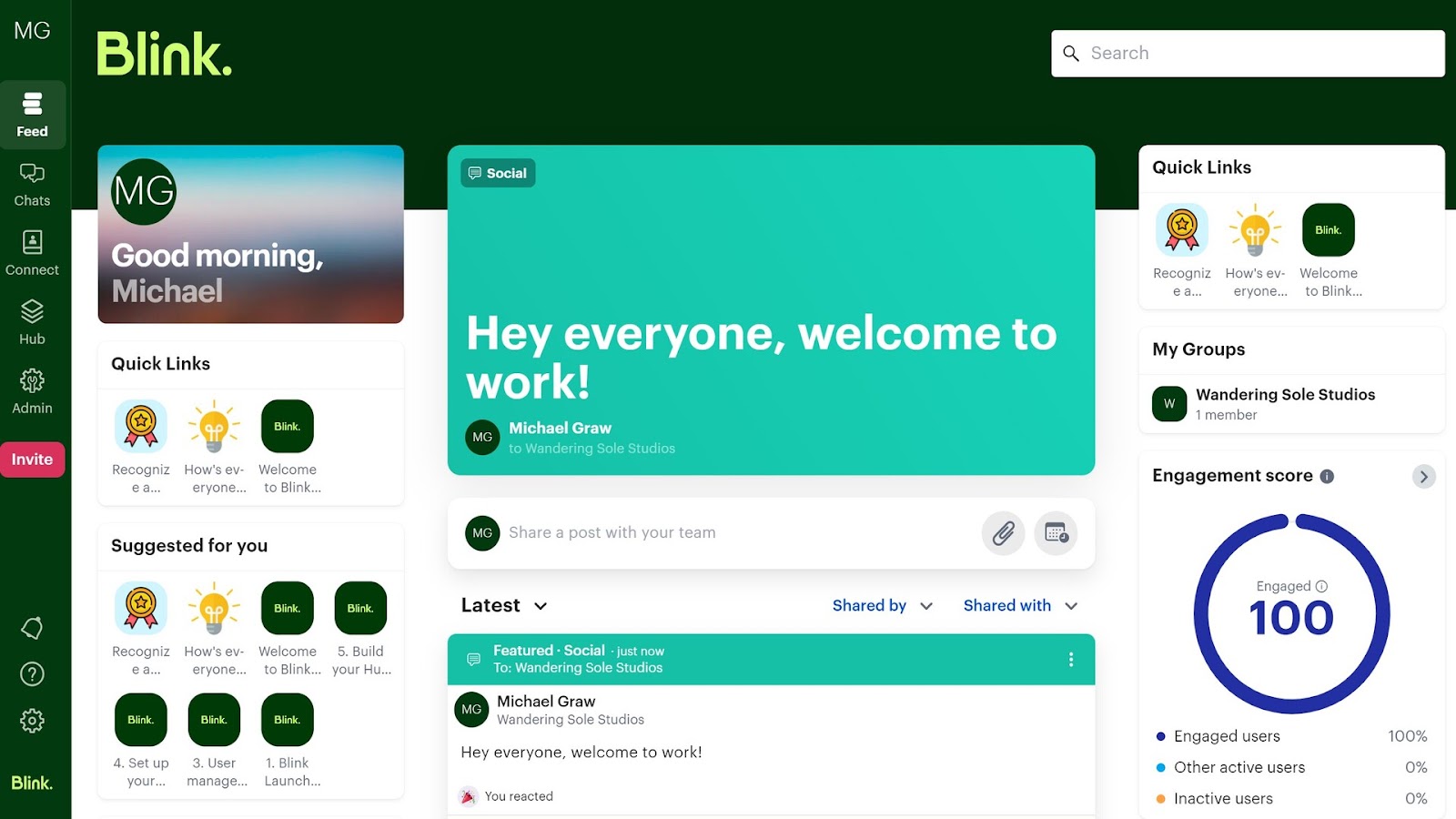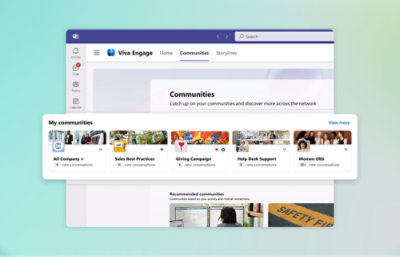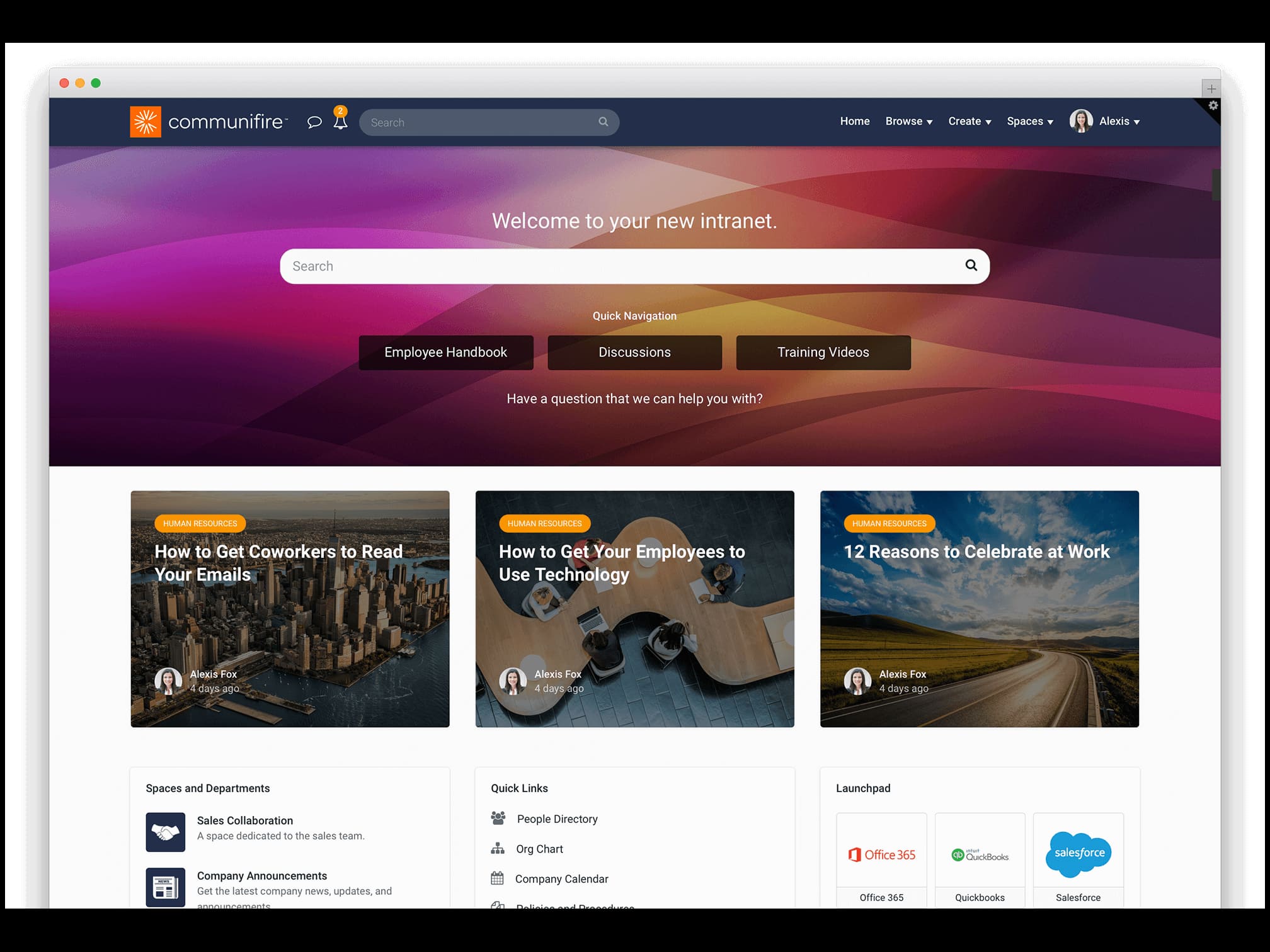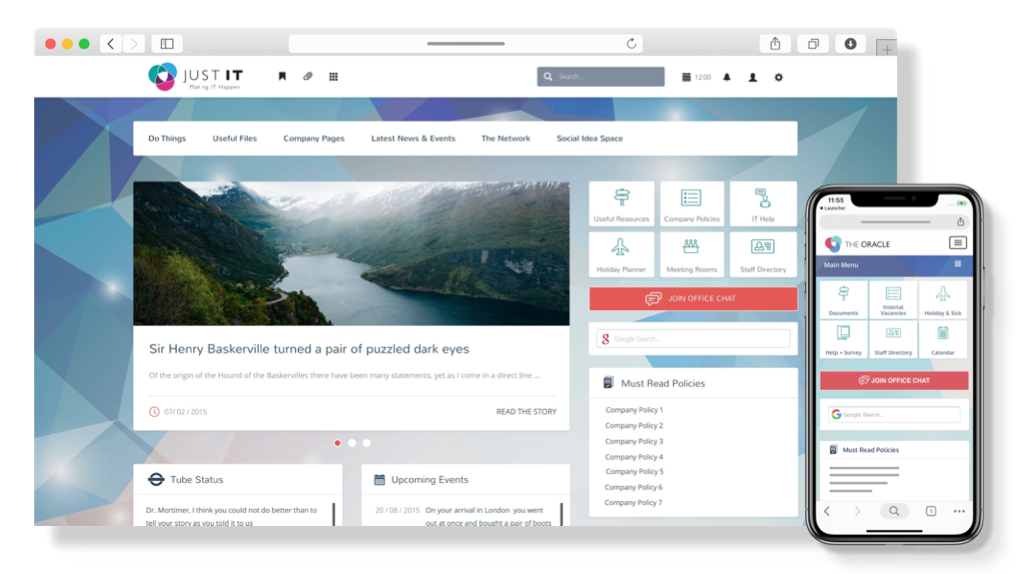Best employee engagement platforms (2025 ranked guide)
Employee engagement platforms have become essential tools for modern organisations navigating hybrid work, dispersed teams, operational complexity and the increasing need for clear, consistent, personalised communication. The right platform will be far more than just a chronological news feed, it's your opportunity to really strengthen culture, centralise knowledge, empower frontline users, connects office-based teams and helps leaders communicate at scale with clarity and relevance.
But with dozens of platforms on the market, each with different strengths, purposes and features — choosing the best employee engagement platform for your organisation is challenging. Some tools are built for frontline workers, others for internal comms teams, others for intranet managers or HR leaders. Some are culture-first, others are governance-first, and some are operations-first.
This ranked guide cuts through that complexity by analysing the 13 best employee engagement platforms in 2025, using criteria based on:
✔ Real-world buyer switching behaviour
✔ Employee engagement depth
✔ Internal comms workflows
✔ Frontline suitability
✔ Content governance
✔ Feature and capability depth
✔ Mobile vs desktop experience
✔ AI and personalisation
✔ Analytics and reporting
✔ Support quality
✔ Overall scalability
How we gathered the data (methodology)
This guide is built using a clear, practical evaluation process designed to reflect how real comms, HR and digital workplace professionals select employee engagement platforms in 2025.
1. Real Buyer Switching Insight
We analysed actual platform switching behaviour from mid-market and enterprise organisations to understand what drives teams to adopt or replace specific tools.
2. Hands-On Product Evaluation
We tested platforms directly through demos, sandboxes and admin environments to assess usability, mobile experience, governance, structure, targeting, AI and communication workflows.
3. Practitioner Feedback
We gathered insights from internal comms, HR, IT and frontline operations leaders to understand strengths, limitations and long-term scalability from a user perspective.
4. Independent Research & Public Sources
We reviewed vendor documentation, feature releases, integration directories, customer stories, analyst perspectives and verified third-party reviews.
5. Capability & Experience Scoring
Each platform was assessed using consistent scoring categories across communication, structure, governance, personalisation, mobile performance, integration depth and overall scalability.
The 25 best employee engagement platforms 2025
| Platform | Core Strengths | Best For |
|---|---|---|
| Oak Engage |
All-in-one employee hub combining targeted comms, mobile engagement and strong governance. |
Mid–large organisations wanting a single, scalable engagement platform |
| Workvivo | Social feed, recognition tools, culture building, polished UX | Organisations prioritising culture, visibility & emotional engagement |
| Staffbase | Editorial workflows, branded apps, multi-language comms, governance | Enterprise comms teams with strict publishing needs |
| Firstup | Automation, personalised journeys, multi-channel delivery, behavioural insights | Global organisations needing orchestration at scale |
| Unily | Enterprise intranet structure, deep customisation, multilingual, governance | Large enterprises with complex content architecture |
| Interact | Policy management, mandatory reads, compliance & governance features | Regulated industries requiring controlled, auditable communication |
| LumApps | Google Workspace alignment, multilingual support, flexible page design | Google-based companies needing intranet + comms blend |
| Simpplr | Governance-first, AI content maintenance, clean UI, accurate content | Organisations prioritising content quality & governance |
| Happeo | Lightweight, intuitive, Google integration, simple navigation | Teams wanting simplicity + Google Workspace alignment |
| MangoApps | All-in-one capabilities, workflows, value pricing, frontline tools | Budget-conscious organisations needing broad functionality |
| Beekeeper | Frontline workflows, shift tools, automations, mobile-first | Operational industries: hospitality, logistics, manufacturing |
| Sociabble | Advocacy, gamification, campaigns, external amplification | Marketing- and sales-led organisations |
| Haiilo | Clean interface, simple pages, social feed, easy adoption | Organisations wanting basic comms + light intranet |
1. Oak Engage — Best Overall Employee Engagement Platform (2025)
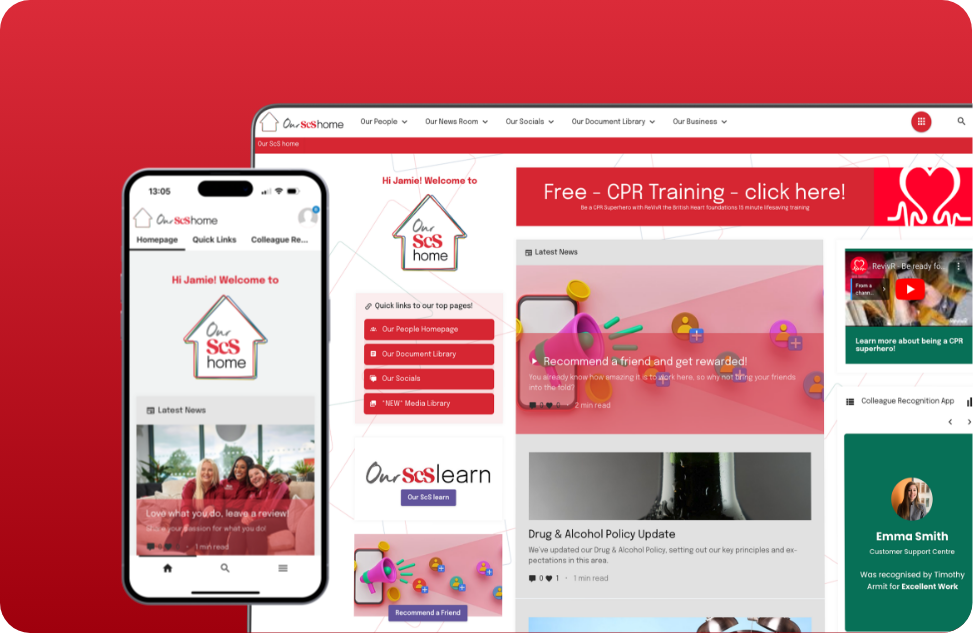
Suitability & Ideal Use Cases
Oak Engage is the best employee engagement platform for organisations needing a single, unified system that supports both frontline and office-based teams with rich social style communication, structured content, modern intranet functionality, personalised delivery and analytics. It the ideal choice for mid-sized and enterprise organisations facing a range of challenges: communicating across multiple locations and varied employee types, governance demands, multilingual needs or regulated environments.
Its balanced approach, combining intranet structure with engaging communication and AI-driven personalisation, makes Oak the best choice for bringing together fragmented systems and solving inconsistent communication. It suits organisations modernising outdated intranets, reducing information overload or upgrading from social-style engagement apps lacking governance or structure.
Oak is also ideal for companies wanting a future-proof platform. Its targeting engine, Smart Delivery AI and analytics provide strategic communication control, ensuring employees receive relevant content at the right time, through the right channel. For organisations treating engagement as a long-term EX investment, Oak is the best choice.
Deep Comparison & Why Organisations Choose It
Oak Engage offers a combination rare in the market: intranet-level structure, modern comms tooling, mobile engagement, frontline support, governance, analytics and AI personalisation — all in one platform. Where many platforms lean heavily toward social engagement or information storage, Oak bridges both worlds.
Key reasons organisations switch from alternatives to Oak include:
-
Outgrowing mobile-only or feed-only tools
-
Needing governance, structure and knowledge architecture
-
Wanting unified communication across all employee types
-
Needing multilingual content, mandatory reads and version control
-
Looking for consistent brand and communication consolidation
-
Wanting to reduce noise and boost message relevance with AI
Oak frequently replaces tools like SharePoint intranets, Blink, Workvivo, Firstup or legacy intranet software that lacks mobile sophistication. Its modern design, flexible content model and communication features allow teams to create hubs, pages, communities, policies, news, and behaviour-triggered messages in a single environment.
Mini Capability Table — Oak Engage
| Capability | Supports? |
|---|---|
| Mobile App | ✔ |
| Structured Intranet Pages | ✔ |
| Social Feed | ✔ |
| AI Targeting / Smart Delivery | ✔ |
| Governance & Permissions | ✔ |
| Mandatory Reads | ✔ |
| Multilingual Support | ✔ |
| Workflows | ✔ |
| Frontline Tools | ✔ |
| Integrations (MS & Google) | ✔ |
Pricing
Custom quoted based on organisation size, modules and deployment.
2. Workvivo — Best for Social Engagement & Culture
Suitability & Ideal Use Cases
Workvivo is the best employee engagement platform for organisations prioritising culture, community, recognition and social connection. It is highly effective in workplaces where employee voice, storytelling, celebrations and collaboration are core engagement drivers. If your workforce engages naturally with social-style interfaces, Workvivo delivers one of the strongest user experiences in the market.
It is well-suited to industries like technology, healthcare, education and professional services where employees benefit from a sense of belonging and visibility. Workvivo also performs well in environments where culture-building and recognition are key to engagement outcomes.
However, it is less suited to highly governed, compliance-heavy or intranet-dependent environments. If structured content, deep knowledge management or governance is a priority, Workvivo is likely to need to be paired with a second platform.
Deep Comparison & Why Organisations Choose It
Workvivo stands out for its modern, consumer-grade interface. The social feed, shoutouts, stories, celebrations, events and communities feel polished and intuitive. This makes Workvivo extremely successful at improving morale and fostering connection.
Compared to competitors, Workvivo is stronger on emotional engagement but weaker on organisational structure. It does not aim to be a full intranet, nor does it offer complex governance, content lifecycle, or enterprise-level architecture. Large organisations sometimes hit limitations with content discoverability or long-term scalability of knowledge.
Many buyers choose Workvivo over competitors because of its aesthetic, ease of use and cultural impact. But they often move to platforms like Oak when governance needs grow.
Mini Capability Table — Workvivo
| Capability | Supports? |
|---|---|
| Mobile App | ✔ |
| Structured Intranet Pages | ✖ |
| Social Feed | ✔ |
| AI Targeting | ✖ |
| Governance & Permissions | ✖ |
| Mandatory Reads | ✖ |
| Multilingual Support | ✔ |
| Workflows | ✖ |
| Frontline Tools | ✔ |
| Integrations | ✔ |
Pricing
Custom quoted.
3. Staffbase — Best for Internal Communications Teams
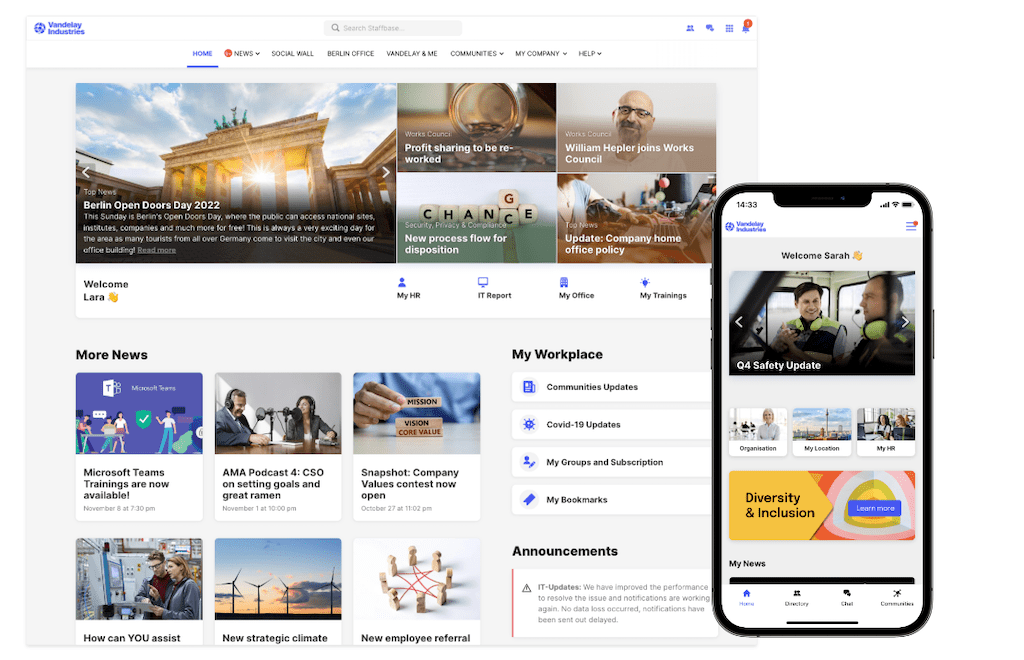
Suitability & Ideal Use Cases
Staffbase is the best employee engagement platform for organisations with formal internal communication teams who manage large-scale, multi-channel communication. It is ideal for enterprises with governance needs, editorial workflows, branded communication channels and distributed audiences.
It suits industries such as finance, healthcare, aviation, manufacturing and large-scale retail — particularly where communication must be controlled, compliant and professionally executed. Staffbase offers newsroom-style planning and enterprise editorial tools unmatched in the category.
Staffbase is less suitable for organisations searching for a strong social feed, AI tools or features for connecting to frontline staff. It leans toward corporate communications rather than a range of employee engagement features.
Deep Comparison & Why Organisations Choose It
Staffbase’s strength lies in its communication engine: editorial calendars, governance workflows, branded communication apps, segmentation, analytics and multi-channel delivery. It is one of the most mature enterprise communications platforms available.
Compared to Workvivo and Blink-like mobile engagement apps, Staffbase offers significantly more control and structure. Compared to Oak or Unily, Staffbase is less focused on intranet architecture or hybrid knowledge management.
Large enterprises typically choose Staffbase when communication accuracy, brand control, message orchestration and content governance are paramount. It is powerful, professional and scalable — but requires investment and proper implementation.
Mini Capability Table — Staffbase
| Capability | Supports? |
|---|---|
| Mobile App | ✔ |
| Structured Intranet Pages | ✔ |
| Social Feed | ✔ (light) |
| AI Targeting | ✖ |
| Governance & Permissions | ✔ |
| Mandatory Reads | ✔ |
| Multilingual Support | ✔ |
| Workflows | ✖ |
| Frontline Tools | ✖ |
| Integrations | ✔ |
Pricing
Custom quoted.
4. Firstup — Best for automated, Multi-channel workforce communication
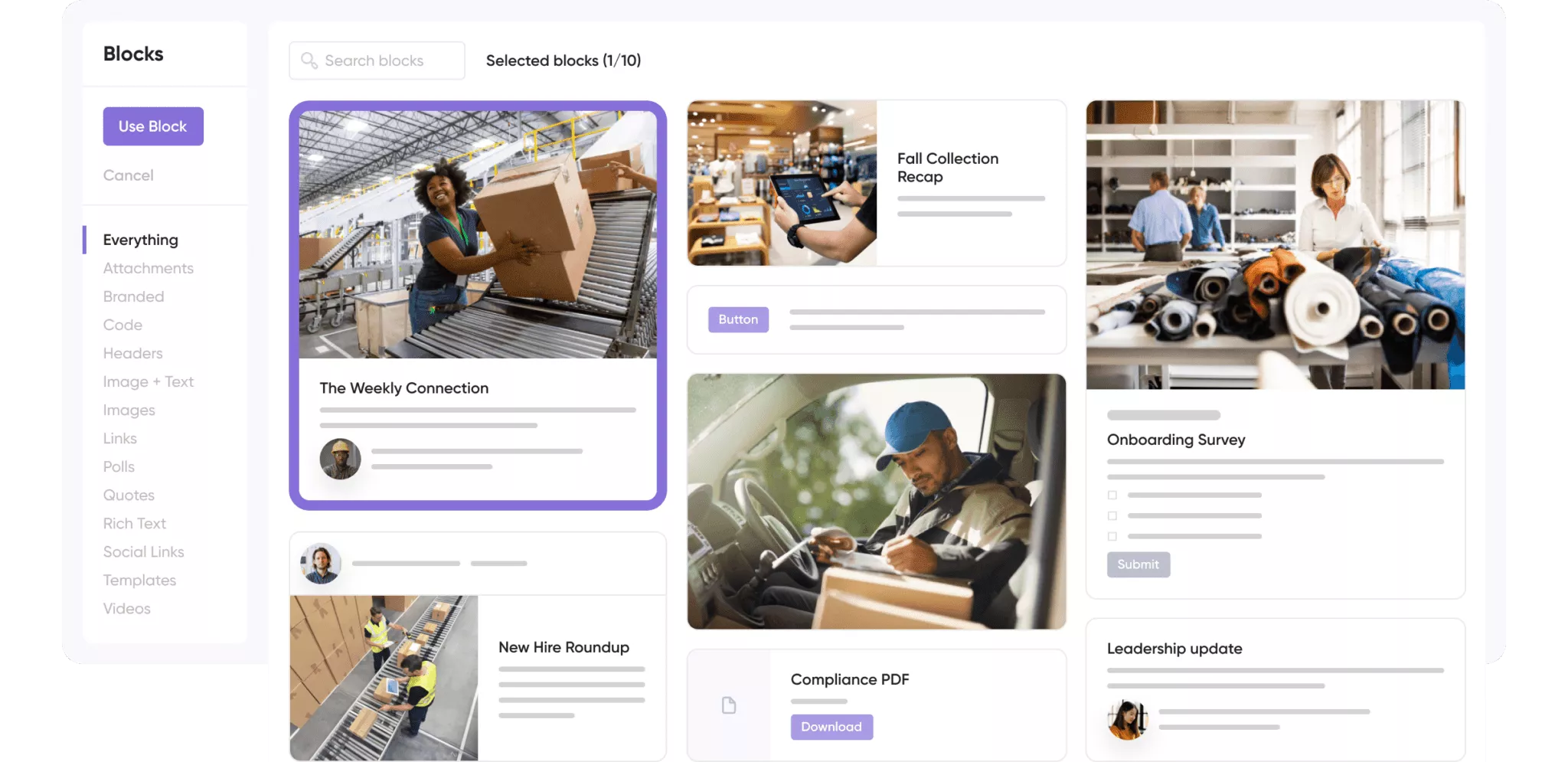
Suitability & Ideal Use Cases
Firstup is the best employee engagement platform for organisations that require highly automated, personalised digital communication at a global scale. It is especially well suited to enterprises with tens of thousands of employees spread across multiple geographies, job functions and communication channels. Firstup excels where communication workflows must be automated and orchestrated with precision — delivering the right message, through the right channel, based on user behaviour, roles or data triggers.
This makes Firstup a strong choice for industries such as retail, logistics, healthcare, aviation and manufacturing — sectors where large frontline populations must receive timely, relevant information consistently. It is also a fit for organisations seeking advanced segmentation, journey-based communication, and multi-channel messaging beyond traditional intranet or app delivery.
Firstup, however, is not always the best choice for organisations needing structured intranet pages, knowledge architecture or content governance tools. It is a communication orchestration platform first, not a full digital workplace.
Deep comparison & why organisations choose it
The core value of Firstup lies in its powerful automation and orchestration engine. Its platform uses behavioural data, preference signals and targeting rules to deliver personalised communication journeys across mobile, desktop, email, SMS and digital signage. This multi-channel approach helps organisations reach employees regardless of location or device.
Compared to traditional employee engagement platforms, Firstup is technically more complex but also more powerful for enterprise communication leaders. The trade-off is a heavier implementation phase and a higher cost, as well as the need for communication teams to adapt to workflow-based content delivery.
Many organisations switch to Firstup when they outgrow basic messaging platforms and require deep personalisation, AI-powered automation and centralised communication planning across multiple channels.
Mini capability table — Firstup
| Capability | Supports? |
|---|---|
| Mobile App | ✔ |
| Structured Intranet Pages | ✖ |
| Social Feed | ✖ |
| AI Targeting | ✔ |
| Governance & Permissions | ✔ |
| Mandatory Reads | ✔ |
| Multilingual Support | ✔ |
| Workflows | ✔ |
| Frontline Tools | ✔ |
| Integrations | ✔ |
Pricing
Custom quoted; generally enterprise-tier.
5. Unily — Best for Enterprise-Grade Intranet Structure & Governance
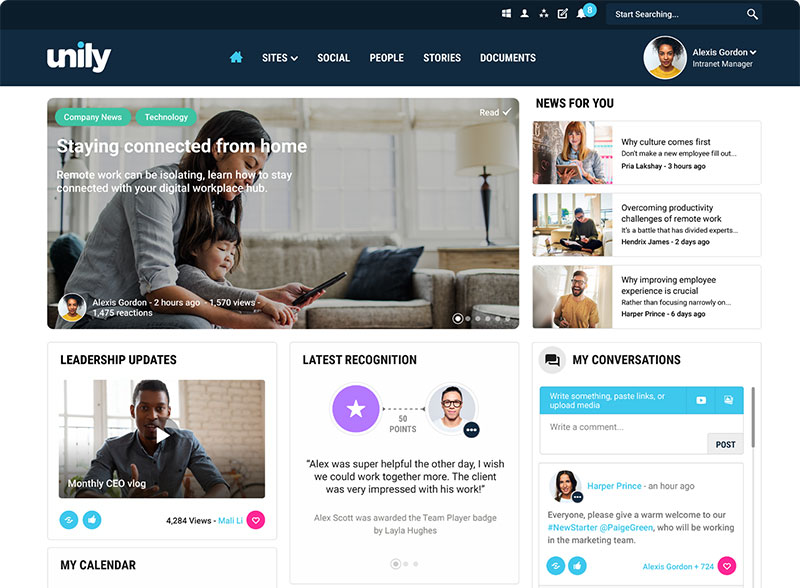
Suitability & ideal use cases
Unily is one of the most advanced digital workplace and employee engagement platforms available, designed primarily for large global enterprises requiring deep intranet functionality, structured content governance, multilingual support and highly customisable employee experiences. It is ideal for organisations with mature digital workplace strategies and significant internal content operations.
Unily is particularly strong for organisations with diverse global locations where governance compliance, brand control and complex taxonomies are essential. Industries such as finance, pharmaceuticals, government, global retail, telecoms and large-scale manufacturing benefit significantly from Unily’s structure.
However, Unily tends to be overpowered — and overly expensive — for small or mid-size organisations. It is an enterprise platform in every sense: deep, robust, sophisticated and complex.
Deep comparison & why organisations choose it
Unily delivers one of the most powerful and flexible intranet frameworks on the market. It offers advanced CMS capabilities, custom layouts, multilingual content, personalised pages, permission controls, structured hubs, knowledge libraries and detailed analytics. It also supports events, micro-applications, integrations and deep design control.
Compared to platforms like Workvivo or Blink, Unily is significantly more enterprise-focused. Compared to Oak and Simpplr, it offers greater customisation but can be more challenging to implement.
Organisations switch to Unily when simpler tools cannot support deep governance, structured content or enterprise information architecture. It rarely loses head-to-head comparisons on functionality — only on budget, scalability of support, or implementation effort.
Mini Capability Table — Unily
| Capability | Supports? |
|---|---|
| Mobile App | ✔ |
| Structured Intranet Pages | ✔ |
| Social Feed | ✔ |
| AI Targeting | ✖ |
| Governance & Permissions | ✔ |
| Mandatory Reads | ✔ |
| Multilingual Support | ✔ |
| Workflows | ✔ |
| Frontline Tools | ✖ |
| Integrations | ✔ |
Pricing
Enterprise-level; custom quoted.
6. Interact — Best for policy, compliance & content governance

Suitability & ideal use cases
Interact is the best employee engagement platform for organisations where content governance, policy management, mandatory reads and compliance are mission-critical. It is especially well suited for regulated industries such as finance, healthcare, legal services, government and manufacturing where content accuracy and control matter as much as engagement.
Interact works well for organisations that need structured hubs, deep search capability, strict version control, and detailed governance workflows. It is ideal for organisations replacing outdated, compliance-heavy intranets and needing a more modern, intuitive way to deliver structured information.
However, Interact is less suited to organisations prioritising social engagement, recognition features or frontline operational workflows. It is a governance-first platform.
Deep comparison & why organisations choose it
Interact’s greatest strengths are its structured content system and its enterprise search engine. Organisations can create well-organised hubs, policy libraries, knowledge areas and workflows, ensuring content stays accurate and up to date. Its mandatory reads, targeted distribution and lifecycle management help teams meet compliance and audit requirements.
Compared to simpler engagement platforms, Interact offers significantly more structure. Compared to Oak or Unily, it offers deep governance but less social and mobile sophistication. For many organisations, Interact is chosen when regulatory risk outweighs the need for social engagement.
Mini capability table — Interact
| Capability | Supports? |
|---|---|
| Mobile App | ✔ |
| Structured Intranet Pages | ✔ |
| Social Feed | ✖ |
| AI Targeting | ✖ |
| Governance & Permissions | ✔ |
| Mandatory Reads | ✔ |
| Multilingual Support | ✔ |
| Workflows | ✔ |
| Frontline Tools | ✖ |
| Integrations | ✔ |
Pricing
Custom quoted; priced for mid-large organisations.
7. LumApps — Best for Google Workspace organisations
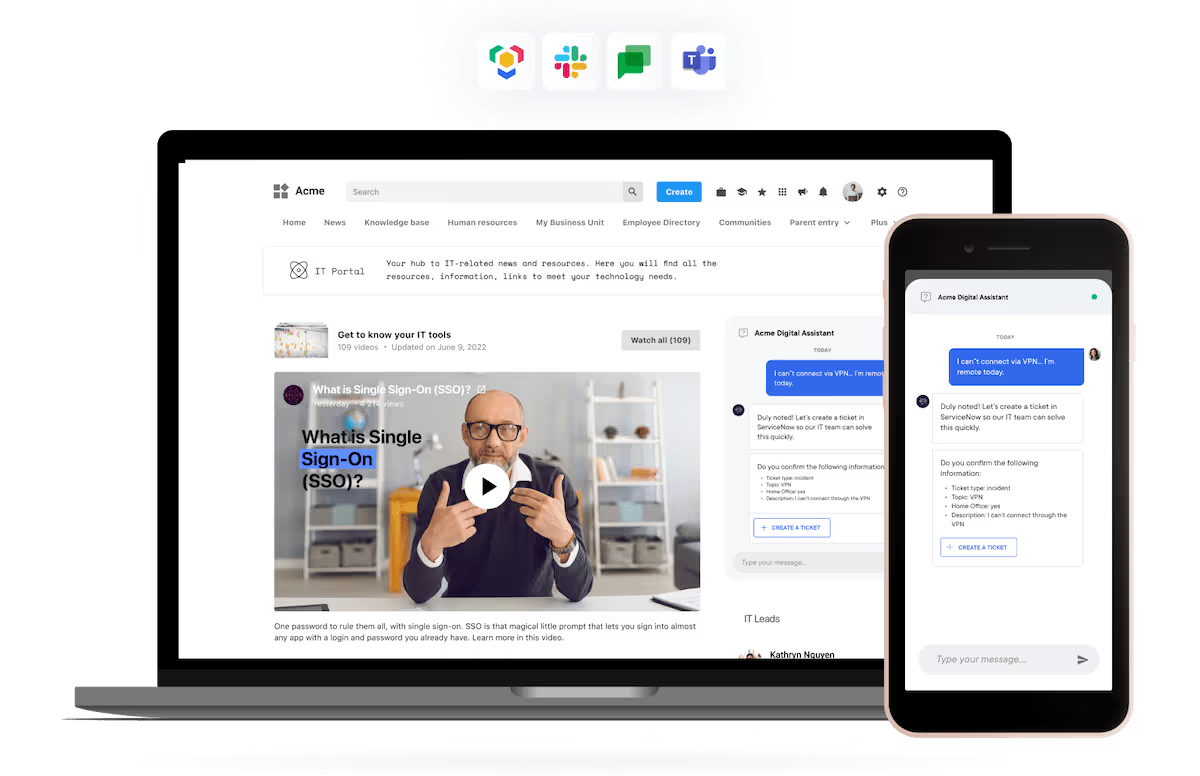
Suitability & ideal use cases
LumApps is the a good employee engagement platform for organisations built on Google Workspace. It provides a flexible, design-rich intranet and communication platform deeply integrated with Google Drive, Gmail, Google Groups and the wider Workspace ecosystem. This makes it ideal for companies wanting seamless alignment with existing Google workflows.
LumApps is suited to mid-size and enterprise organisations that need multilingual content, custom-designed pages, strong search and content governance — without the complexity of heavier enterprise platforms like Unily. It is particularly effective for centralising knowledge, distributing comms and supporting global teams.
LumApps is less suitable for frontline-only workforces, as it is more content-heavy and intranet-focused than mobile-first tools.
Deep comparison & why organisations choose it
LumApps differentiates itself through its flexible page builder, design control, collaborative features and multilingual capabilities. It combines intranet structure with social engagement elements, allowing organisations to blend knowledge, communication and community.
Compared to Happeo, LumApps is deeper, more structured and more enterprise-grade. Compared to Simpplr, it is more design-flexible but sometimes more complex. Compared to Oak, it has strong design and multilingual strengths but fewer communication and AI personalisation capabilities.
Mini capability table — LumApps
| Capability | Supports? |
|---|---|
| Mobile App | ✔ |
| Structured Intranet Pages | ✔ |
| Social Feed | ✔ |
| AI Targeting | ✔ (limited) |
| Governance & Permissions | ✔ |
| Mandatory Reads | ✔ |
| Multilingual Support | ✔ |
| Workflows | ✖ |
| Frontline Tools | ✖ |
| Integrations | ✔ (Google-native) |
Pricing
Custom quoted; no public tiers.
8. Simpplr — Best for content governance & predictability

Suitability & ideal use cases
Simpplr is the best employee engagement platform for organisations prioritising governance, content accuracy, structure and quality control. It suits organisations where outdated content, inconsistent communication or poor version control have become operational risks. Simpplr focuses on helping organisations maintain accurate, usable, high-quality information.
Industries such as financial services, government, professional services and large healthcare systems benefit from Simpplr’s governance-first model. It is ideal for organisations modernising outdated intranets or implementing a content governance framework for the first time.
It is less suitable for frontline-heavy organisations or teams prioritising social engagement.
Deep comparison & why organisations choose it
Simpplr’s differentiator is its AI-powered content maintenance system, which automatically flags outdated pages, identifies redundant content and recommends updates. It ensures quality and consistency across large intranet environments. This makes it popular with enterprises wanting an always-accurate digital workplace.
Compared to Unily, Simpplr is simpler and cleaner but less customisable. Compared to Oak, it excels in governance but lacks social engagement, AI delivery and frontline support. Compared to Workvivo, it is more structured but less fun.
Mini Capability Table — Simpplr
| Capability | Supports? |
|---|---|
| Mobile App | ✔ |
| Structured Intranet Pages | ✔ |
| Social Feed | ✖ |
| AI Targeting | ✔ (content maintenance) |
| Governance & Permissions | ✔ |
| Mandatory Reads | ✔ |
| Multilingual Support | ✔ |
| Workflows | ✖ |
| Frontline Tools | ✖ |
| Integrations | ✔ |
Pricing
Custom quoted.
9. Happeo — Best lightweight intranet for simplicity & Google-Focused Teams
Suitability & ideal use cases
Happeo is ideal for organisations that want a lightweight, user-friendly intranet tightly aligned with Google Workspace. It is especially useful for small-to-mid-size businesses, hybrid teams and organisations wanting a clean, simple way to structure company knowledge and communications without the overhead of large enterprise platforms.
Happeo suits organisations wanting channels, communities, team spaces, simple navigation and easy access to Google files and documents. It is less suitable for frontline-only teams or compliance-driven organisations needing governance-heavy frameworks.
Deep comparison & why organisations choose it
Happeo excels at simplicity. It removes complexity found in platforms like Unily or LumApps and offers a clean, intuitive interface for knowledge sharing and communication. It integrates deeply with Google Workspace and is designed for users who spend most of their time in Google tools.
Where it falls short is governance, personalisation and enterprise-grade features. It works best for organisations wanting simplicity, not depth.
Mini capability table — Happeo
| Capability | Supports? |
|---|---|
| Mobile App | ✔ |
| Structured Intranet Pages | ✔ |
| Social Feed | ✔ |
| AI Targeting | ✖ |
| Governance & Permissions | ✖ |
| Mandatory Reads | ✖ |
| Multilingual Support | ✔ |
| Workflows | ✖ |
| Frontline Tools | ✖ |
| Integrations | ✔ (Google-centric) |
Pricing
Custom quoted.
10. MangoApps — Best budget all-in-one platform for engagement & operations
Suitability & ideal use cases
MangoApps is best suited for organisations that want a broad, multifunctional engagement platform at a budget-friendly price. It is especially appealing to teams that need communication, collaboration, knowledge, tasks, workflows and training tools all under one roof — without the cost of larger enterprise systems.
Industries such as manufacturing, healthcare, logistics, K-12 education and mid-market retail often choose MangoApps because it provides strong functional breadth for the cost. It suits organisations trying to consolidate multiple systems (e.g. intranet + chat + task management + training) into a single, value-focused platform.
It is less ideal for organisations needing deep design control, advanced governance, AI personalisation or modern UX polish. MangoApps prioritises capability breadth over aesthetic refinement.
Deep comparison & why organisations choose it
MangoApps is one of the most feature-rich platforms in the category. It includes team communication, social feeds, intranet pages, wikis, document libraries, learning features, polls, forms, tasks, workflows and more. This breadth makes it an all-in-one digital workplace for smaller budgets.
The downside: MangoApps can appear busy or overwhelming. The interface is functional but not as visually modern as platforms like Oak, Workvivo or Simpplr. For some users, the sheer number of modules creates complexity.
Organisations typically choose MangoApps as a cost-effective alternative to enterprise systems when they want function over finesse — and when operational workflows matter as much as engagement.
Mini capability table — MangoApps
| Capability | Supports? |
|---|---|
| Mobile App | ✔ |
| Structured Intranet Pages | ✔ |
| Social Feed | ✔ |
| AI Targeting | ✖ |
| Governance & Permissions | ✔ |
| Mandatory Reads | ✖ |
| Multilingual Support | ✔ |
| Workflows | ✔ |
| Frontline Tools | ✔ |
| Integrations | ✔ |
Pricing
Tiered modular pricing; request quote.
11. Beekeeper — Best platform for operational frontline engagement

Suitability & ideal use cases
Beekeeper is the best employee engagement platform for operational, shift-based and frontline industries such as hospitality, logistics, manufacturing, warehousing, food service and transport. It is designed for workers who are not desk-based and need real-time communication, shift coordination and mobile workflows.
Beekeeper suits organisations where operational efficiency is just as important as engagement. It excels in environments where checklists, shift notes, announcements, micro-workflows and automation are essential to daily productivity.
It is not a full intranet and does not attempt to support complex governance or structured content. It is engagement + operations — not engagement + intranet.
Deep comparison & why organisations choose it
Beekeeper goes beyond communication to provide shift management, workflows, micro-automations, checklists, forms and operational tasking. This makes it significantly more operations-focused than Workvivo, Staffbase or Happeo.
Compared to Oak or Firstup, Beekeeper is less robust on intranet structure and cross-channel orchestration, but stronger on frontline workflow functionality.
Organisations typically choose Beekeeper when the bottleneck is operational communication — not content governance or enterprise-wide comms strategy.
Mini capability table — Beekeeper
| Capability | Supports? |
|---|---|
| Mobile App | ✔ |
| Structured Intranet Pages | ✖ |
| Social Feed | ✔ |
| AI Targeting | ✖ |
| Governance & Permissions | ✖ |
| Mandatory Reads | ✖ |
| Multilingual Support | ✔ |
| Workflows | ✔ |
| Frontline Tools | ✔ |
| Integrations | ✔ |
Pricing
Custom quoted.
12. Sociabble — Best engagement platform for employee advocacy & brand amplification
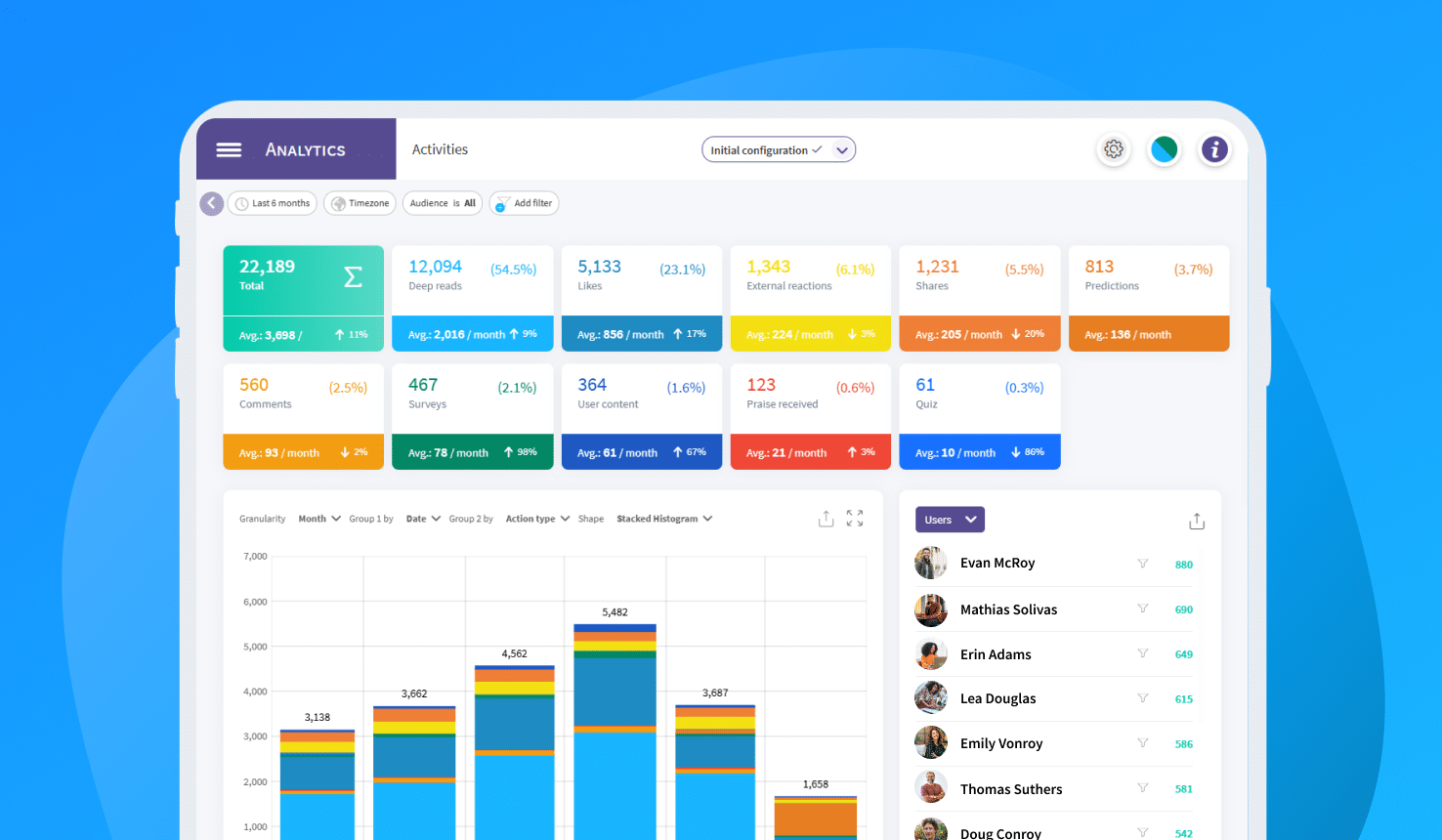
Suitability & ideal use cases
Sociabble is the best engagement platform for organisations wanting to drive employee advocacy, external content sharing, gamification and brand amplification. It suits marketing-led organisations, sales teams, retail groups, agencies and global brands that rely on employee influence as part of their engagement strategy.
It also works well for organisations focused on campaigns, social interaction and recognition. Sociabble is less suitable for companies requiring deep intranet structure, governance or policy control — it is an advocacy-first engagement tool.
Deep comparison & why organisations choose it
Sociabble differentiates itself through its brand-led approach. It focuses on user-generated content, social campaigns, challenges, leaderboards, rewards and amplification. While it supports internal communication, its strongest value lies in extending engagement beyond the company’s walls.
Compared to Workvivo, Sociabble is more externally oriented. Compared to Oak or Simpplr, it is significantly lighter on structure, governance and content management. Organisations often use Sociabble as a complement to another intranet system rather than a replacement.
It is chosen when the goal is motivation, visibility and advocacy — not organisational communication strategy.
Mini Capability Table — Sociabble
| Capability | Supports? |
|---|---|
| Mobile App | ✔ |
| Structured Intranet Pages | ✖ |
| Social Feed | ✔ |
| AI Targeting | ✖ |
| Governance & Permissions | ✖ |
| Mandatory Reads | ✖ |
| Multilingual Support | ✔ |
| Workflows | ✖ |
| Frontline Tools | ✖ |
| Integrations | ✔ |
Pricing
Custom quoted; mid-market and enterprise.
13. Haiilo — Best for simple, clean communication & light intranet needs

Suitability & ideal use cases
Haiilo is best suited for organisations wanting straightforward internal communication with light intranet capability and a modern interface. It works well for mid-sized organisations that need simple news distribution, pages, social features and analytics — without needing heavy governance, complex architecture or operational workflows.
Haiilo is especially useful in hybrid and office-based environments where employees expect a clean, modern experience but do not require deeper structural or compliance-based features. It is less suited to frontline-heavy industries or companies with complex content governance needs.
Deep comparison & why organisations choose it
Haiilo provides a well-designed interface with clean layouts, simple navigation and an engaging content feed. It is easier to adopt than enterprise platforms like Unily or Simpplr and requires less technical commitment.
Where Haiilo falls short is in governance, workflows, structured content and advanced targeting. It does not attempt to compete with deep intranet platforms, nor with automation engines like Firstup. It is a simple, elegant communication tool, effective, but limited in scope.
Organisations choose Haiilo when they want “good enough” communication without the overhead of enterprise platforms.
Mini Capability Table — Haiilo
| Capability | Supports? |
|---|---|
| Mobile App | ✔ |
| Structured Intranet Pages | ✔ |
| Social Feed | ✔ |
| AI Targeting | ✖ |
| Governance & Permissions | ✖ |
| Mandatory Reads | ✖ |
| Multilingual Support | ✔ |
| Workflows | ✖ |
| Frontline Tools | ✖ |
| Integrations | ✔ |
Pricing
Custom quoted.
14. Blink — Best Mobile-First Platform for Frontline Communication
Suitability & Ideal Use Cases
Blink is the best employee engagement platform for frontline-heavy organisations requiring fast, mobile-first communication across shift-based or distributed teams. It excels in transport, logistics, healthcare, hospitality and operations-led environments where workers do not use email and need quick access to updates, chats, forms and shift information.
Blink suits organisations where daily operations and engagement overlap—safety messaging, SOPs, shift handovers and urgent announcements. It is less suitable for organisations needing deep intranet structure, governance or knowledge architecture.
Deep Comparison & Why Organisations Choose It
Blink’s strength lies in real-time mobile communication and operational workflows. It integrates with scheduling tools, HR systems and shift platforms, giving frontline teams a unified mobile hub. Compared to Workvivo, Blink is more operational and less social. Compared to Oak or Simpplr, it lacks structured content, governance and enterprise intranet capabilities.
Organisations choose Blink when they prioritise operational efficiency and mobile reach over long-form content management or governance frameworks.
Mini Capability Table — Blink
| Capability | Supports? |
|---|---|
| Mobile App | ✔ |
| Structured Intranet Pages | ✖ |
| Social Feed | ✔ |
| AI Targeting | ✖ |
| Governance & Permissions | ✖ |
| Mandatory Reads | ✖ |
| Multilingual Support | ✔ |
| Workflows | ✔ |
| Frontline Tools | ✔ |
| Integrations | ✔ |
Pricing: Custom quoted.
Learn more
15. Microsoft Viva Engage — Best for Social Communities in Microsoft 365
Suitability & Ideal Use Cases
Viva Engage is ideal for organisations already embedded in Microsoft 365 who want social-style communities, employee groups, leadership engagement and cross-team visibility inside Teams. It suits large enterprises that need lightweight social engagement without deploying an additional platform.
It is less suitable for organisations needing structured intranet pages, governance workflows, or a standalone mobile-first platform.
Deep Comparison & Why Organisations Choose It
Viva Engage extends the Microsoft ecosystem by adding community spaces, Q&A, leadership announcements and social engagement features directly into Teams. It’s chosen because it fits into existing IT governance and requires no new apps.
Compared to Workvivo, it’s less polished socially. Compared to Oak or Simpplr, it lacks governance, targeting and content structure. Organisations choose it for ecosystem value, not functional depth.
Mini Capability Table — Viva Engage
| Capability | Supports? |
|---|---|
| Mobile App | ✔ (via Teams) |
| Structured Intranet Pages | ✖ |
| Social Feed | ✔ |
| AI Targeting | ✖ |
| Governance & Permissions | Limited |
| Mandatory Reads | ✖ |
| Multilingual Support | ✔ |
| Workflows | ✖ |
| Frontline Tools | Limited |
| Integrations | ✔ (Microsoft) |
Pricing: Included in certain Microsoft 365 / Viva licences.
Learn more
16. Microsoft Viva Connections — Best for SharePoint-Centric Intranet Delivery
Suitability & Ideal Use Cases
Viva Connections is best for organisations whose intranet is already built on SharePoint. It brings SharePoint content into Teams as a unified employee portal. It suits enterprises with existing governance, content architecture and Microsoft 365 maturity.
It is less suitable for companies not heavily invested in SharePoint or those needing strong mobile-first delivery.
Deep Comparison & Why Organisations Choose It
Viva Connections is essentially a delivery layer for SharePoint. Organisations choose it because it leverages their existing Microsoft structure and governance. It doesn’t offer a social feed or engagement mechanics itself.
Compared to Oak, Workvivo or Unily, Connections lacks integrated comms tooling, personalisation and frontline capability. It’s chosen primarily for ecosystem simplicity.
Mini Capability Table — Viva Connections
| Capability | Supports? |
|---|---|
| Mobile App | ✔ (Teams) |
| Structured Intranet Pages | ✔ (via SharePoint) |
| Social Feed | ✖ |
| AI Targeting | ✖ |
| Governance & Permissions | ✔ |
| Mandatory Reads | ✖ |
| Multilingual Support | ✔ |
| Workflows | Limited |
| Frontline Tools | ✖ |
| Integrations | ✔ |
Pricing: Included in Microsoft 365.
Learn more
17. Jostle — Best Lightweight Intranet for Clarity & Communication
Suitability & Ideal Use Cases
Jostle is ideal for small–mid-size organisations wanting a simple, structured intranet with light engagement features. It works well for office-based or hybrid companies needing a clean hub for announcements, documents, events and people information.
It is less suitable for enterprises requiring advanced governance or complex digital workplace architecture.
Deep Comparison & Why Organisations Choose It
Jostle offers a clean, opinionated structure that reduces clutter and maintains clarity. It is easier to deploy than enterprise platforms like Unily or Simpplr. Compared to Workvivo, it is less social; compared to Blink, less frontline-oriented.
It’s chosen because it’s simple, predictable and low-overhead.
Mini Capability Table — Jostle
| Capability | Supports? |
|---|---|
| Mobile App | ✔ |
| Structured Intranet Pages | ✔ |
| Social Feed | ✔ (basic) |
| AI Targeting | ✖ |
| Governance & Permissions | Limited |
| Mandatory Reads | ✖ |
| Multilingual Support | ✔ |
| Workflows | ✖ |
| Frontline Tools | ✖ |
| Integrations | ✔ |
Pricing: SMB–mid-market.
Learn more
18. Yammer (Legacy Viva Engage) — Best for Enterprise Group Discussions
Suitability & Ideal Use Cases
Yammer suits enterprises needing threaded discussions, topic-based communities and cross-organisational collaboration. It is useful for big companies wanting persistent conversational spaces that aren’t suited to Teams chat.
It is less suited for frontline teams or companies prioritising mobile-first communication.
Deep Comparison & Why Organisations Choose It
Yammer excels at group conversation and knowledge exchange. It offers persistent communities that store discussions more effectively than Teams channels.
Compared to Viva Engage, it is similar but less modern. Compared to Workvivo, less social. Compared to Oak or Simpplr, it lacks governance and structured content. It’s usually chosen as a secondary community layer.
Mini Capability Table — Yammer
| Capability | Supports? |
|---|---|
| Mobile App | ✔ |
| Structured Intranet Pages | ✖ |
| Social Feed | ✔ |
| AI Targeting | ✖ |
| Governance & Permissions | Limited |
| Mandatory Reads | ✖ |
| Multilingual Support | ✔ |
| Workflows | ✖ |
| Frontline Tools | ✖ |
| Integrations | ✔ (Microsoft) |
Pricing: Included with Microsoft 365.
Learn more
19. Axero (Communifire) — Best Intranet + Collaboration Blend
Suitability & Ideal Use Cases
Axero is well suited for mid-size organisations wanting a robust intranet with collaboration tools, document management, workflows, blogs, wikis and communities. It fits businesses that need a full digital workplace without the cost or complexity of enterprise platforms.
It is less ideal for frontline-heavy companies or organisations wanting modern UI polish.
Deep Comparison & Why Organisations Choose It
Axero is one of the most functionality-rich mid-market intranet platforms. It offers document libraries, workflows, discussion forums, social feeds and structured content all in one system.
Compared to Unily or Simpplr, it offers depth at lower cost. Compared to MangoApps, it is more intranet-oriented than operational. It’s chosen for breadth and value.
Mini Capability Table — Axero
| Capability | Supports? |
|---|---|
| Mobile App | ✔ |
| Structured Intranet Pages | ✔ |
| Social Feed | ✔ |
| AI Targeting | ✖ |
| Governance & Permissions | ✔ |
| Mandatory Reads | ✔ |
| Multilingual Support | ✔ |
| Workflows | ✔ |
| Frontline Tools | ✖ |
| Integrations | ✔ |
Pricing: Mid-market tier.
Learn more
22. Claromentis — Best for Intranet + Business Process Workflows
Suitability & Ideal Use Cases
Claromentis is ideal for organisations that want an intranet with built-in business process tools, such as forms, workflows, project management and e-learning. It suits mid-size companies, professional services, healthcare, education and public sector teams wanting content + collaboration + process automation in one environment.
It is less suited for organisations that prioritise consumer-grade social engagement or frontline-first communication.
Deep Comparison & Why Organisations Choose It
Claromentis stands out because it offers a suite of digital workplace apps beyond standard intranet features. Employees can access forms, workflows, e-learning modules, knowledge bases, project dashboards and social features—all in the same platform.
Compared to Oak or Simpplr, Claromentis is more operations-focused. Compared to MangoApps, it offers a cleaner intranet-first structure with less clutter. Organisations choose Claromentis when they need a multifunctional workspace without the cost or complexity of enterprise platforms.
Mini Capability Table — Claromentis
| Capability | Supports? |
|---|---|
| Mobile App | ✔ |
| Structured Intranet Pages | ✔ |
| Social Feed | ✔ |
| AI Targeting | ✖ |
| Governance & Permissions | ✔ |
| Mandatory Reads | ✔ |
| Multilingual Support | ✔ |
| Workflows | ✔ |
| Frontline Tools | ✖ |
| Integrations | ✔ |
Pricing: Custom; mid-market tier.
Learn more
Employee engagement platform considerations for different sized businesses
Small Businesses (1–250 Employees)
Priorities: Simplicity, Cost, Fast Adoption
Small businesses need platforms that deliver immediate value without overwhelming complexity. With limited internal comms or IT resources, the ideal solution is easy to roll out, intuitive for employees and affordable.
Key Considerations
-
Ease of setup: Minimal configuration, plug-and-play deployment.
-
Low admin overhead: Shouldn’t require a full-time owner.
-
Simple communication: One place for updates, messages and basic resources.
-
Cost control: Predictable, SMB-friendly pricing structures.
-
Scalability: Enough flexibility to grow with the organisation.
Best Fit Platforms
Happeo · Jostle · Bonusly · Officevibe · TINYPulse · MangoApps (SMB edition)
Mid-Sized Businesses (250–2,000 Employees)
Priorities: Structure, Governance, Targeting, Frontline Reach
Mid-market organisations often operate across multiple sites with mixed employee types—office, hybrid and frontline. They need more structure than small businesses but cannot absorb enterprise-level complexity.
Key Considerations
-
Role-based content targeting: Ensures relevance and reduces noise.
-
Structured intranet hubs: Policies, handbooks, forms and team spaces become essential.
-
Light governance: Permissions, approvals and ownership frameworks.
-
Mobile-first engagement: Critical for frontline and operational teams.
-
High value-to-cost ratio: Enterprise-level impact without enterprise spend.
Best Fit Platforms
Oak Engage · Staffbase · Simpplr · Interact · LumApps · Haiilo · Blink · MangoApps
Enterprise Businesses (2,000+ Employees)
Priorities: Governance, Compliance, Personalisation, Multilingual & Multi-Channel Delivery
Enterprises face the most complex communication challenges: global workforces, formal governance requirements, layered business units and multiple communication channels.
Key Considerations
-
Enterprise-grade governance: Permissions, workflows, version control, mandatory reads.
-
Multi-channel orchestration: Mobile app, desktop, email, SMS, signage, kiosks.
-
AI-driven personalisation: Content automatically tailored by role, region, department and behaviour.
-
Multilingual infrastructure: Translation workflows and localisation.
-
Deep integrations: HRIS, identity, productivity, document management and analytics.
-
Security & scalability: Certifications, SLAs and global support.
Best Fit Platforms
Oak Engage · Firstup · Staffbase · Unily · LumApps · Perceptyx · Jive · Viva Connections / Viva Engage
Comparison Chart: Employee Engagement Requirements by Company Size
| Requirement / Feature | Small Business | Mid-Market | Enterprise |
|---|---|---|---|
| Budget Flexibility | Low | Moderate | High |
| Implementation Complexity | Very low | Medium | High |
| Governance Needs | Minimal | Growing | Extensive |
| Intranet Structure Required | Optional | Important | Critical |
| Targeted Communication | Nice-to-have | Important | Essential |
| Mobile / Frontline Support | Useful | Strongly needed | Mandatory |
| Multilingual Content | Rare | Occasional | Essential |
| Integrations (HRIS, M365, Google) | Light | Moderate | Deep |
| Compliance & Mandatory Reads | Rare | Useful | Required |
| AI Personalisation | Not needed | Useful | Strategic |
| Collaboration Complexity | Simple | Mixed | Global & layered |
| Best Platform Types | Lightweight comms & recognition | Modern intranet + comms hybrid | Full-scale EX & orchestration platforms |
Conclusion: Choosing the best employee engagement platform in 2025
Choosing the best employee engagement platform depends on your organisation’s structure, communication strategy, workforce makeup and maturity level across internal communications and employee experience. The platforms reviewed here span a wide spectrum of needs — from socially driven tools to governance-heavy intranets to automation-first communication engines to frontline operations platforms.
But the main priority of engagement is clear: organisations want unified systems.
They want personalisation, governance, mobile usability, desktop structure, analytics and AI — all within a single platform that works for both frontline and office-based teams.
This is where Oak Engage stands out as the most complete employee engagement platform for 2025. It offers:
✔ Modern intranet
✔ Targeted communication
✔ Mobile-first engagement
✔ Content governance
✔ Smart Delivery AI
✔ Analytics
✔ Social features
✔ Frontline support
✔ Multilingual capabilities
…all of these things work together to make up an all-in-one unified employee experience platform.
Whether you’re replacing a legacy intranet, upgrading from a mobile-only app, modernising internal communications or connecting dispersed teams — the right platform will determine your engagement strategy for years to come.
FAQs
What is an employee engagement platform?
A system that helps organisations centralise internal communication, share knowledge, connect employees and improve engagement across hybrid or frontline workforces.
How is this different from an intranet?
Intranets organise structured content; engagement platforms focus on communication and connection. Modern tools like Oak combine both.
Which platform is best for frontline teams?
Beekeeper, MangoApps and Oak Engage are the strongest options for mobile-first, shift-based or operational environments.
Which platform is best for internal comms teams?
Staffbase, Firstup and Oak Engage offer the strongest communication workflows, governance and targeting.
How much do these platforms cost?
Most vendors provide custom quotes based on organisation size, features and deployment. Enterprise platforms typically cost more than social-first or lightweight tools.
Can an engagement platform replace an intranet?
Yes— engagement platforms are essentially the 'modern version' of an intranet, providing structured pages, governance, search and content lifecycle management. Platforms like Oak, Unily and Simpplr can fully replace traditional intranets.
